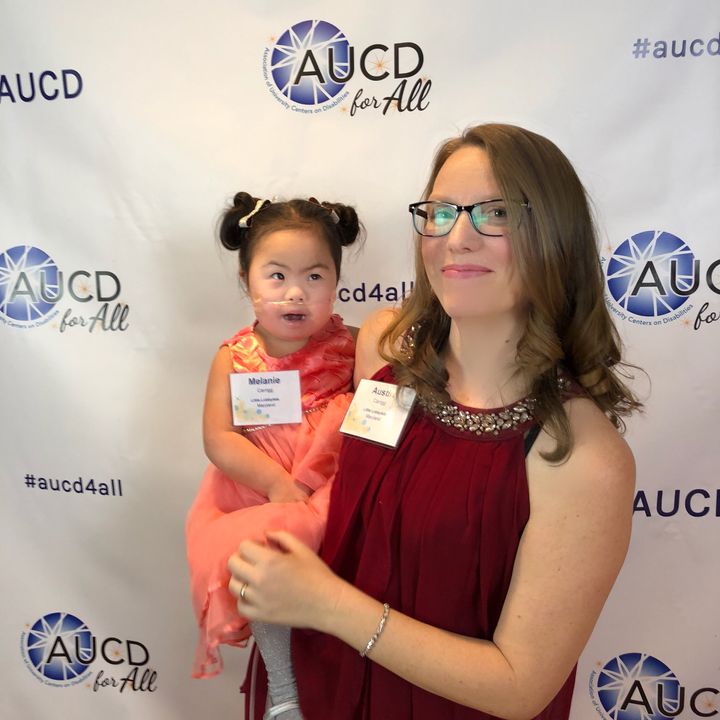Low blood sugar may be frequent in Down Syndrome

The mother who first connected the dots, Austin Carrigg, shares, “It took us years even after my daughter’s first hospital admission, in which she was severely ill and unable to be awakened to receive a diagnosis and subsequent treatment for her low blood sugar. Time and time again, my concerns were invalidated by medical providers telling me there was no way there could be anything else wrong with her because she had Down syndrome. I think of all of the days that I knew something was wrong and no one would listen. Today I hope we impress upon the world that they need to listen to families. Our observations are valuable.”
Austin Carrigg spent years being dismissed by doctors due to the perception that her daughter's symptoms were simply just due to her having Down syndrome. She turned to Danielle Drachmann, the founder of Ketotic Hypoglycemia International, after seeing multiple children with both Down syndrome and ketotic hypoglycemia (low blood sugar with accelerated fat burn) in the patient organizations support group on Facebook.
Danielle Drachmann contacted researchers of the organization’s scientific advisory board, who took the concern seriously and engaged in a research collaboration with the organization to perform an international web-based questionnaire study. The findings have now been published, sparking considerable interest. Over seven percent of the responders reported documented or suspected low blood sugar in their children with Down syndrome. A combination, no one has reported before, suggesting a high degree of under-diagnosis and treatment.
Jacob Petersen, a Novo Nordisk professor, and coauthor, shares: “The result is so important that very few researchers will achieve such a result during their entire career. It shows how important it is to reap the knowledge that relatives and patients have.”
“Children with Down syndrome may do better if their ketotic hypoglycemia was diagnosed and treated. Doctors need to be aware of this possibility”, states professor Henrik Christesen, a co-author of the study. “The questionnaire was not performed on an unbiased or unselected cohort of patients with Down syndrome, but still there is an idea that ketotic hypoglycemia may be frequent in Down syndrome as seen for other syndromes like Prader Willi syndrome and Silver Russell syndrome.”
Overeating or nausea might be symptoms
Many individuals with Down syndrome eventually become obese and get type 2 diabetes, owing to a range of factors. If overeating is the result of the feeling of excess hunger due to low blood sugar, this should be diagnosed and treated. If this papers’ indications are correct, a new and preventable cause has become clear.
Nausea and vomiting are a frequent indication of low blood sugar which is accompanied by accelerated fat burn, also known as ketosis. Investigations into low blood sugar and high ketones are warranted if children present with lethargy, failure to thrive, vomiting, or irritability, which resolves with the administration of food. Patients with Down syndrome are no exception.
"For centuries, we have been failing the patients with Down Syndrome from getting the medical investigations they needed. Now it is time to change that and to take responsibility," states hypoglycemia expert Dr. David Weinstein from the US, who has spent his entire career dedicated to helping children with hypoglycemia.
|
Facts about ketotichypoglycemia |
Consequences of severe hypoglycemia
If hypoglycemia goes undetected, it can lead to acute brain dysfunction and eventually to irreversible brain damage. The ketones produced by fat metabolism are, however, protective to the brain as an alternative fuel to glucose. Whether low blood sugar has an impact on the brain function in affected individuals with Down syndrome has yet to be studied.
Prevention of hypoglycemia may result in improved developmental and cognitive outcomes in patients with syndromes, proof of which has been shown in Prader Willi Syndrome.
From patient involvement to co-creation
Ketotic Hypoglycemia International performed the study not only in collaboration with hypoglycemia experts, but also with support from the Down syndrome organization, Making Chromosomes Count (https://makingchromosomescount.co.uk/)
This research process is an example of how a research ecosystem fostering patient partnership could be practiced, built upon a foundation of co-creation and empowerment of patients and their caregivers. In this specific research process, it has been the caregivers who identified new disease patterns on social media, which with the medical experts onboard then accelerated to a meaningful multi-stakeholder co-created research process.
“We hope that the Down syndrome community will show interest in this novel aspect of Down syndrome”, first author Danielle Drachmann says. “We would like to further collaborate with Down syndrome patient organizations and their doctors. We have with this project demonstrated the power of co-creation in medical research, and how far we can come if we dare to step away from the usual tick-box-patient involvement. To see how the mutual respect and shared mission have led caregivers working alongside medical experts on a potential new medical discovery. This project has been nothing but extraordinary”.
Next steps
To validate the findings of this research, there is a need for funding for clinical trials, as well as uniting medical experts in trisomy 21 with the authors of this research paper. We urge anyone to contact us, if they have input to either one of the actions.
|
Facts The Patient Organization can be found here: www.ketotichypoglycemia.org Read the scientific article “Ketotic hypoglycemia in Down syndrome” here: |
Contacts
Henrik ChristesenProfessor
henrik.christesen@rsyd.dkDanielle Drachmann
danielle.drachmann@ketotichypoglycemia.orgImages

About Syddansk Universitet
Subscribe to releases from Syddansk Universitet
Subscribe to all the latest releases from Syddansk Universitet by registering your e-mail address below. You can unsubscribe at any time.
Latest releases from Syddansk Universitet
De første læger fra den regionale kandidatuddannelse i medicin i Esbjerg er uddannet26.6.2025 09:33:49 CEST | Pressemeddelelse
De første 21 nyuddannede læger fra den regionale kandidatuddannelse ved Syddansk Universitet på Esbjerg Sygehus – Syddansk Universitetshospital har 25. juni aflagt lægeløftet
Første læger fra SDU i Esbjerg har aflagt lægeløfte25.6.2025 18:51:24 CEST | Pressemeddelelse
Historisk dag på Esbjerg Sygehus – Syddansk Universitetshospital: De første kandidater i medicin er færdiguddannede
En indsats for bedre forståelse af hjernens aldring25.6.2025 09:03:17 CEST | Pressemeddelelse
Manouchehr Seyedi Vafaee er udnævnt til professor i neuroimaging og neurobiologisk aldringsforskning på SDU. Professoratet skal styrke vores viden om hjernens aldring og afklare mekanismerne bag Alzheimers sygdom og andre neurologiske lidelser.
Batterierne fra verdens længstsejlende el-færge får nyt liv: Fra bølgeskvulp til solskin19.6.2025 10:04:40 CEST | Pressemeddelelse
El-færgen Ellen er en klimadarling. Men hvad gør man med 26.000 slidte battericeller? To SDU-forskere vil bruge batterierne til at lagre sol og vind.
Nye tandlæge- og tandplejeruddannelser på Syddansk Universitet18.6.2025 16:08:25 CEST | Pressemeddelelse
Den politiske beslutning om tandlæge- og tandplejeruddannelser på SDU imødekommer Region Syddanmarks behov for flere tandfaglige specialister, som kan styrke den regionale sundhedssektor og sikre bedre tandpleje til borgerne.
In our pressroom you can read all our latest releases, find our press contacts, images, documents and other relevant information about us.
Visit our pressroom
